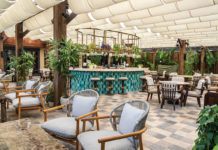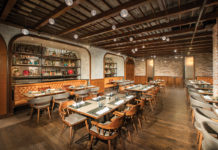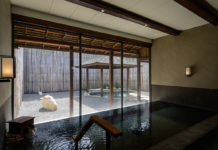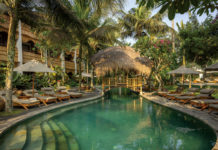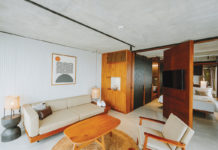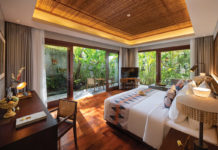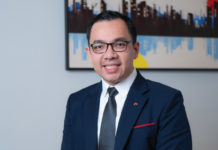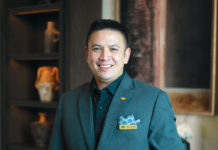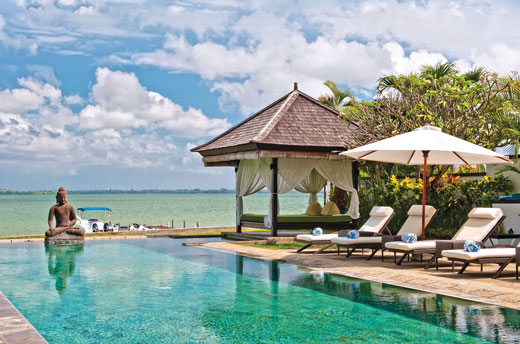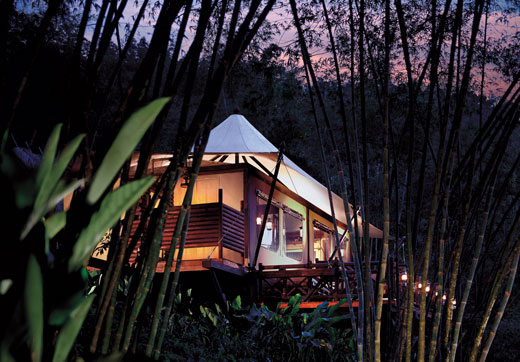Ida Bagus Gede Sidharta Putra is a renowned figure in Bali, leading the Sanur Painters Association, the Sanur Development Foundation and the Denpasar branch of the Indonesian Hotel and Restaurant Association, as well as serving as managing director of the Santrian Group and owning, among others, Griya Santrian, Puri Santrian and The Royal Santrian hotels.
Gusde, as he is fondly called, gained his MBA at Maryville University in St. Louis, USA, as well as taking courses at Massachusetts Institute of Technology (MIT) including Leading Innovation for Sustainability and Uniting Leadership in Diversity.
With such a varied background and busy life, Asia Dreams was delighted to meet up with this prominent businessman at the Puri Santrian hotel beach club to talk about hospitality, sustainability and development.
Q: First in Bali, Sanur was the original tourist destination. How are you balancing Balinese life with the needs of tourism here?
A: The role of the local community and the Sanur Village Foundation, which I chair, has the goal of maintaining tradition whilst improving local prosperity. We try to ensure that we limit the number of hotels and encourage businesses that focus on local well-being, for example.
We also work to maintain a real sense of community, so people feel welcome and at home, but not just by suggestion. We also introduce legislation, like the spatial planning regulations that ensure that development must comply with our goals.
On the cultural side, we encourage activities such as the kites flown by the youth groups. We support the religious activities on the beach and throughout Sanur and ensure development that fits our model. Sanur has been able to find a middle road. We welcome investment, but investors must follow and respect our traditions and rules.
Q: The central government picked Sanur as one of five pilot areas for national tourism development. What lessons do you want to teach people coming to you to learn from what you have spearheaded in Sanur?
A: The name Sanur is derived from the words se, meaning one, and nur, meaning light, and was chosen by my ancestors, after the one holy light – the sun. Sanur is the birthplace of Indonesian tourism. I feel a strong moral responsibility toward Sanur. It’s also where my family lives and so I am driven to ensure sustainability for Sanur. I hope our experiences and achievements can help develop other areas.
It is possible to copy the successful bits to developing destinations, but in my view it is vital that the community develops its own identity, its own area, and not just a direction imposed by the government or by industry.
Of course, we are proud of what we have achieved and that this is appreciated and copied by others, but I believe tourism must develop as part of the community and avoid overly fast investment. The real fear is that local people can end up being strangers in their own villages or towns and this is unacceptable.
Q: You mentioned identity. Why do you think that’s important?
A: Yes, each area should develop by highlighting its own identity. Indonesia is vast and culturally diverse. In tourism terms this is a major strength. I don’t agree with copying for the sake of it – why decide to copy Singapore when it isn’t who we are? Sanur is different from Ubud, from Kuta, from Jakarta. You still have five-star food and hotels, tourism businesses, alongside traditional ceremonies and a priest leading prayers on the beach beside the sunbathing tourists. We’re proud that Sanur hasn’t changed and lost its own individual identity.
Q: There is much talk about a circular road connecting all of Bali, how do you feel about that?
A: In fact, I think this is better than building an airport in north Bali, with all the resulting pollution and the loss of rice fields that will displace local people. There are many more benefits with the plan to develop a ring road around Bali.
For example, people can live at home and commute, meaning they will spend their salaries in their local towns, not in the already crowded southern part of Bali. The farmers themselves will be able to bring their produce and livestock to the cities quickly, to the benefit of all concerned.
Q: When you were at MIT, you studied Leading Innovation for Sustainability and Uniting Leadership in Diversity, how has that impacted on you personally and on your way of doing business?
A: Interestingly, what I learned at MIT I already knew from Tri Hita Karana. It’s the same concept. Here we have our relationship with God, with humans and with the environment, whilst they talk about removing spiritual, social, or ecological divisions. I shared about Nyepi with the class. They were amazed. I explained the Balinese concept of tumpek, when we celebrate plants, livestock, tools, etc., for supporting our lives.
The class had about 30 people – vice presidents, chairmen, director generals – all with different perspectives and from different backgrounds, but brought together to find a way to work together. The idea of the programme is to establish trust and learn to do something for sustainability and benefit everyone.
Personally, it encouraged me to think even more about us all, to have more empathy, not to think individually, and it really confirmed the value of the Balinese concept of balance, which has transferred to the way I do business.
Q: What do you think is the right way of developing more underdeveloped locations like Jatiluwih, which is now a UNESCO heritage site, while the local people and administration don’t have a tourism background?
A: It needs to be zoned. There is something really good there. It shouldn’t be changed, but it’s all about commitment. If they can manage their originality, maintain their cleanliness and their environment, it will attract more visitors. If the people can then manage, with financial support from the government and with training, not to exploit themselves, tourist numbers will increase.
In my view, it’s better not to make more accommodations and destroy the local environment – the thing that attracts people in the first place. Instead, work out how to move the tourists and visitors from Sanur, Kuta, Nusa Dua, to Jatiluwih so the local people can enjoy the benefits while retaining their identity and autonomy.
Q: Zoning and local autonomy – is that feasible?
A: Yes, you see Bali is like a grocery store: It’s small but everything is available, but it needs to be controlled. In Bhutan, they limit the number of people allowed to visit the country every year so that it doesn’t ruin their daily life; there are so many monks there, they don’t want to commercialize the monks. We need to ensure that tourist areas help subsidize the non-tourism areas for more equitable development.
Q: What tips do you have for the novice hotelier?
A: You have to have your own identity. If you look at all the thousands of brochures around the world, they are nearly the same. You need something that differentiates your product. For us, it is service, culture, maybe architecture, so people know where they are. Secondly, you have to ensure your hotel is giving more, exceeding expectations. Lastly, compete with service, gadgets, with facilities, but not necessarily with price, or your margins will fall and your quality will have to fall.
Q: Away from your hotels, where do you like to eat with your family and friends?
A: I always make sure that I am home every day to eat dinner with my family. It’s very important for me to spend that time together with my wife and children. Sometimes we barbecue. If we want to go out, I ask my friends for recommendations because everything develops so quickly. We don’t mind if it’s a roadside stall or fine dining, so long as it’s good food and ambience.
My mother is a wonderful cook. She still cooks for all of us, even though my brothers and I have all moved out and have our own families. As my mother is part of the Karangasem palace, she cooks foods that are rare nowadays. It’s very authentic food without preservatives.
I like to visit the mountains too. It’s cooler and it makes a difference from being by the beach all day.
www.santrian.com


